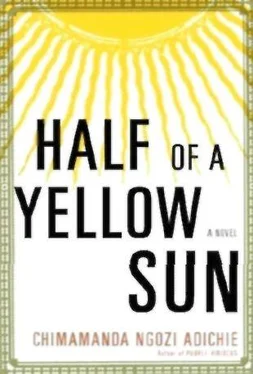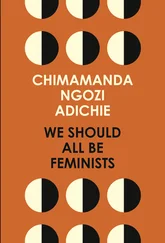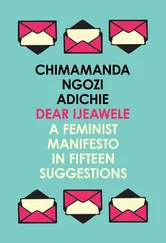"Oh."
"Are you silently condemning me for profiteering from the war? Somebody had to import the stockfish, you know." Kainene raised her eyebrows; they were penciled in, thin fluid arcs. "Many contractors were paid and didn't deliver. At least I did."
"No, no, I wasn't thinking that at all."
"You were."
Olanna looked away. There were too many things swirling around in her head. "I was so worried when Port Harcourt fell. I sent messages."
"I got the letter you sent to Madu." Kainene rearranged the straps of her handbag. "You said you were teaching. Do you still? Your noble win-the-war effort?"
"The school is a refugee center now. I sometimes teach the children in the yard."
"And how is the revolutionary husband?"
"He's still with the Manpower Directorate."
"You don't have a wedding photo."
"There was an air raid during our reception. The photographer threw his camera down."
Kainene nodded, as if there were no need to feel sympathy at this news. She opened her bag. "I came to give you this. Mum sent it through a British journalist."
Olanna held the envelope in her hand, unsure whether to open it in front of Kainene.
"I also brought two dresses for Baby," Kainene said, and gestured to the bag she had placed on the floor. "A woman who came back from Sao Tome had some good children's clothes for sale."
"You bought clothes for Baby?"
"How shocking indeed. And it's about time the girl began to be called Chiamaka. This Baby business is tiresome."
Olanna laughed.
To think that her sister was sitting across from her, that her sister had come to visit her, that her sister had brought clothes for her child. "Will you drink water? It's all we have."
"No, I'm fine." Kainene got up and walked to the wall, where the mattress leaned, and then came back and sat down. "You didn't know my steward Ikejide, did you?"
"Isn't he the one Maxwell brought from his hometown?"
"Yes." Kainene got up again. "He was killed in Port Harcourt. They were bombing and shelling us, and a piece of shrapnel cut off his head, completely beheaded him, and his body kept running. His body kept running and it didn't have a head."
"Oh, God."
"I saw him."
Olanna got up and sat next to Kainene on the bench and put an arm around her. Kainene smelled of home. They said nothing for long minutes.
"I thought about changing your money for you," Kainene said. "But you can do it at the bank and then deposit, can't you?"
"Haven't you seen the bomb craters all around the bank? My money is staying under my bed."
"Make sure the cockroaches don't get to it. Life is harder for them these days." Kainene leaned against Olanna and then, as if she had suddenly remembered something, she got up and straightened her dress; Olanna felt the slow sadness of missing a person who was still there.
"Goodness. I didn't know how much time had passed," Kainene said.
"Will you visit again?"
There was a pause before Kainene said, "I spend most of the day at the refugee camp. Maybe you can come and see it." She fumbled for a piece of paper in her handbag and wrote down the directions to her house.
"Yes, I'll come. I'll come next Wednesday."
"Will you drive?"
"No. Because of the soldiers. And we never have much petrol."
"Greet the revolutionary for me." Kainene climbed into the car and started it.
"Your number plates are different," Olanna said, looking at the vig printed before the numbers.
"I paid extra to stamp my patriotism on my car. Vigilance!" Kainene raised her eyebrows and a hand before she drove off. Olanna watched the Peugeot 404 disappear down the road and stood there for a while, feeling as if she had swallowed a sparkling sliver of light.
On Wednesday, Olanna arrived early. Harrison opened the door and stared, so surprised he seemed to have forgotten his usual bow. "Madam, good morning! It is a long time!"
"How are you, Harrison?"
"Fine, madam," he said, and bowed, finally.
Olanna sat on one of the two sofas in the bright and bare living room with flung-open windows. A radio was turned on high somewhere inside, and when she heard approaching footsteps, she forced her mouth to relax, not sure what she would say to Richard. But it was Kainene, in a rumpled black dress, holding her wig in her hand.
"Ejima m," she said, hugging Olanna. Their embrace was close, their bodies pressed warmly against each other. "I was hoping you would come in time so we could go together to the research center first before the refugee camp. Will you have some rice? I didn't realize how long it's been since I ate rice until the relief people gave me a bag last week."
"No, not now." Olanna wanted to hold her sister for much longer, to smell that familiar scent of home.
"I was listening to Nigerian radio. Lagos says Chinese soldiers are fighting for us and Kaduna says every Igbo woman deserves to be raped," Kainene said. "Their imagination impresses me."
"I never listen to them."
"Oh, I listen more to Lagos and Kaduna than to Radio Biafra. You have to keep your enemy close."
Harrison came in and bowed. "Madam? I am bringing drinks?"
"The way he goes on you would think we had a grand cellar in this half-built house in the middle of nowhere," Kainene muttered, combing her wig with her fingers.
"Madam?"
"No, Harrison, don't bring drinks. We're leaving now. Remember, lunch for two."
"Yes, madam."
Olanna wondered where Richard was.
"Harrison is the most pretentious peasant I have ever seen," Kainene said, as she started the car. "I know you don't like the word peasant."
"No."
"But he is, you know."
"We are all peasants."
'Are we? It's the sort of thing Richard would say."
Olanna's throat felt instantly parched.
Kainene glanced at her. "Richard left very early today. He's going to Gabon to visit the kwashiorkor center next week and he said he needed to see to the arrangements. But I think he left so early because he felt awkward about seeing you."
"Oh." Olanna pursed her lips.
Kainene steered with a careless confidence, past potholes on the road, past palm trees stripped of fronds, past a thin soldier pulling along a thinner goat.
"Do you ever dream of that child's head in the calabash?" she asked.
Olanna looked out of the window and remembered the slanting lines crisscrossing the calabash, the white blankness of the child's eyes. "I don't remember my dreams."
"Grandpapa used to say, about difficulties he had gone through, 'It did not kill me, it made me knowledgeable. ' O gburo m egbu, o mee ka m main ife."
"I remember."
"There are some things that are so unforgivable that they make other things easily forgivable," Kainene said.
There was a pause. Inside Olanna, something calcified leaped to life.
"Do you know what I mean?" Kainene asked.
"Yes."
At the research center, Kainene parked under a tree and Olanna waited in the car. She hurried back moments later. "The man I want isn't there," she said, and started the car. Olanna said nothing else until they arrived at the refugee camp. It was a primary school before the war. The buildings looked faded, most of the once-white paint peeled off. Some refugees who were standing outside stopped to stare at Olanna and to say nno to Kainene. A young lean priest in a discolored soutane came up to the car.
"Father Marcel, my twin sister, Olanna," Kainene said.
The priest looked surprised. "Welcome," he said, and then added, unnecessarily, "You are not identical."
They stood under a flame tree while he told Kainene that the bag of crayfish had been delivered, that the Red Cross really had suspended relief flights, that Inatimi had come earlier with somebody else from the Biafran Organization of Freedom Fighters and said he would return later. Olanna watched Kainene speak. She did not hear much of what Kainene said, because she was thinking of how unrelenting Kainene's confidence was.
Читать дальше












